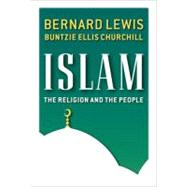
What is included with this book?
Bernard Lewis is Cleveland E. Dodge Professor of Near Eastern Studies, Emeritus, at Princeton University. He is the author of the best-sellers What Went Wrong: Western Impact and Middle Eastern Response and The Crisis of Islam: Holy War and Unholy Terror. He has performed the invaluable service of placing current events in the context of history. Lewis has advised policymakers in the U.S., UK, and the Middle East on the complex relationship between Islam and the West.
A number of his articles have been extraordinarily prescient. The Return of Islam was published 3 years before the Iranian revolution, and the award-winning The Roots of Muslim Rage anticipated 9/11 by a decade. His two dozen books have been translated into more than two dozen languages, including Arabic, Persian, Turkish, and Indonesian.
His contribution to the understanding of history has been recognized by the 15 universities that have awarded him honorary doctorates.
Buntzie Ellis Churchill served for 23 years as President of the World Affairs Council of Philadelphia, hosting dozens of world leaders from Mikhail Gorbachev and Margaret Thatcher to Henry Kissinger and Colin Powell. A member of the Council on Foreign Relations, she has served as a trustee of many non-profit organizations, including the Pennsylvania Institute of Technology and Drexel University. She has been awarded several honorary doctorates.
For a decade she hosted “WorldViews,” a daily radio show, interviewing experts on international issues
| Preface | p. xv |
| Introduction | p. 1 |
| The Faith and the Faithful | p. 7 |
| The Pillars of the Faith | p. 13 |
| Scripture, Tradition and Law | p. 25 |
| The Mosque | p. 39 |
| Diversity and Tolerance | p. 51 |
| Sunni, Shi'a, and Others | p. 61 |
| Some History | p. 71 |
| Government and Opposition | p. 81 |
| The Wider World of Islam | p. 91 |
| Islam and the Economy | p. 97 |
| Women in Islam | p. 111 |
| Dress | p. 127 |
| Language and Writing | p. 137 |
| War and Peace | p. 145 |
| Radical Islam | p. 155 |
| Conclusion | p. 165 |
| Some Practical Matters | p. 169 |
| Terms and Topics | p. 179 |
| Index | p. 225 |
| Table of Contents provided by Ingram. All Rights Reserved. |
The New copy of this book will include any supplemental materials advertised. Please check the title of the book to determine if it should include any access cards, study guides, lab manuals, CDs, etc.
The Used, Rental and eBook copies of this book are not guaranteed to include any supplemental materials. Typically, only the book itself is included. This is true even if the title states it includes any access cards, study guides, lab manuals, CDs, etc.